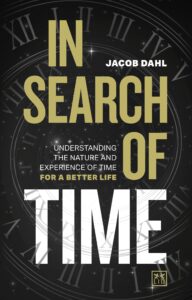|
Short-Termism and the Nature of Time by Jacob Dahl
By Guest Contributor Jacob Dahl
Author of In Search of Time, Jacob Dahl, explains why too much short-term orientation can be damaging to humanity.
We discount the future heavily in both business and our policy-making. Although we often hear passionate speeches about long-term visions, the reality is that many leaders are mostly focused on the next set of financial results or the next upcoming election. The average C-suite tenure in the US is now down to less than 5 years, pretty much the same as one election cycle for most politicians. And although many will have strong initial long-term intentions coming from a good heart, the financial markets and public opinion will be ruthless if they don’t deliver on the short lane.
I remember a fascinating radio show I once listened to, where two philosophers discussed whether it was ok to eat aliens if we at some point should find them and they turned out to be of a less intelligent but very meaty nature. And the philosophers, after some deliberations, in the end, agreed that it was acceptable for us to do that. Like during the years of imperialism it reflects that we are comfortable exploiting, destroying and even occasionally eating anything that is far from how we perceive ourselves. This is in many ways how we treat our future distant generations, they are not here, they are not like us, we are not really attached to them, so we are relatively comfortable leaving them with a climate crisis, toxic waste and financial debt problems.
We know it is ethically wrong, but in everyday trade-offs, we heavily discount the future outcomes for the benefit of the short-term gains. And in many cases, the trade-off is not even real. McKinsey research from a few years ago shows that long-term-oriented companies generate more revenue, more profits, more innovation and more jobs than the shorter-term oriented even over short periods of time.
I believe that one of the root causes behind the observable short-term behaviors is that we, especially in the Western world, have developed an alienated relationship to time. We have a very linear perception of time, our remaining time on Earth is reduced every second and our always-on society has created a shared feeling that time passes quicker than ever. We do not have sufficient time in our everyday lives, so we increase the tread speed in the hamster wheel and focus on short-term achievements. Contrast this with most Asian cultures, where time and life are seen as much more cyclical. Or contrast it to some of the indigenous cultures, like the Haudenosaunee (a confederation of 6 native American tribes), who have the “seventh-generation principle” in all their major decisions, basically making sure that society is sustainable multi-generations ahead.
Now you might ask, isn’t our time concept in the West not just reflecting the reality – the true nature of time is that there is a big life clock ticking and we can’t change that, so we better get the most out of it fast. In my recent book In Search of Time, I try to get closer to the nature of time by looking at it through 10 different lenses, from the latest theories in physics, biology and neuroscience to the history and philosophies of time. And although nothing certain can be said, it has become increasingly clear to me that time really does not exist as a physical entity and many physicists will today model the world without a time dimension. But it is also clear that time is as a very useful human concept when we model and interpret the world around us. This is somewhat similar to when we perceive different electromagnetic waves as beautiful colors – it is a shared and very useful model of the world, but quite far from the true physical reality
And our concept of time is not a static thing. The ancient Romans were the first to introduce a society around time devices (water clocks, and sundials at that time), this was further accelerated by the strict time discipline of the church during the Middle Ages. Time was put into the production function for real when the Industrial revolution emerged and the notion that time is money was introduced and accepted. Our current 24/7 information society is further accentuating our short time horizons. Our increased ‘mastering’ of time has yielded amazing progress and prosperity, but in the process, we might have changed our concept of time to yield unwanted effects like the very observable short-term behaviors.
The question then becomes, if we buy the hypothesis that time really doesn’t exist as a physical entity, can we readjust our concept of time to become more “timeless’ and long-term oriented? This is obviously a tall order for a habit and a belief which has been ingrained in us for many centuries via religion, rulers, policymakers and business.
The intentions are certainly in place and, as earlier mentioned, many leaders will come into their new roles with aspiring long-term visions and plans, but are dragged down by the reality of their daily work – simply because they don’t have the right structures and the adequate incentive systems to pursue a fundamental change towards becoming more long term oriented
For political leaders, you need to find a structure where future generations get a voice. There are interesting experiments in countries like Wales and Japan, which we can take inspiration from. In Wales they have a ‘future generations commissioner’ as a part of the policy-setting team; in Japan, they are roleplaying policy decisions with a ‘representative from 2060’ and are contemplating introducing a Minister for future generations. On the incentive system side, it is admittedly more difficult as you can’t get votes from future generations, but maybe we could experiment more with lowering the age of voters as was debated during the Brexit vote in the UK.
For business leaders, the structural changes start at the board level, where there is a need for a more diversified mix of people between short and long-term thinkers, which can only be sustained if they are backed up by more long-term-oriented investors. The massive movement around ESG investing and ESG policies is a clear step in this direction. Furthermore, the boards and management teams need to be comfortable with longer-term targets and plans, which might be more qualitative and option-based than the current short-term financial targets. Likewise, the remuneration of management teams needs to be further skewed to the long term, a movement which is already well on its way
Looking back at our ancestors or toward other civilizations today, short-term behaviors are not an unchangeable feature in homo sapiens. We need to readjust our concept of time and get more ‘timeless’ in our mindset and actions for the benefit of future generations, but frankly also for our own prosperity. To succeed, a change in our operating structures and incentives is needed, which will take real effort – but the good news is that some of it is already in motion in some countries, some parts of business, and public life.
ABOUT THE AUTHOR

Jacob Dahl is a Senior Partner Emeritus at McKinsey & Co, a board member and investor. He has an MSc in Economics from Copenhagen University, has worked as a management consultant for 26 years and has lived in Denmark, Europe, Africa and Asia with his wife and four children. Jacob has always been passionate about history, philosophy and physics.
Suggested Reading
 In Search of Time looks at time through ten lenses in order to grasp a better understanding of it, as well as laying out the benefits of getting rid of our self-imposed bad time habits.
In Search of Time looks at time through ten lenses in order to grasp a better understanding of it, as well as laying out the benefits of getting rid of our self-imposed bad time habits.
